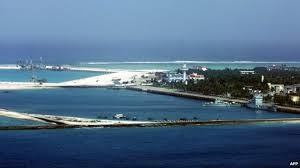
SINGAPORE: The fraught situation in the South China Sea and issues relating to freedom of navigation continue to spark concerns in the region and the world. The South China Sea again dominated discussions at the 2019 Shangri-La Dialogue in Singapore, Asia’s premier security forum. The Dialogue saw two different visions of the South China Sea being presented by US Acting Secretary of Defence Patrick M. Shanahan and China’s Minister of Defence and State Councilor Gen. Wei Fenghe.
Against this backdrop, James M. Dorsey, Senior Fellow at S. Rajaratnam School of International Studies, Singapore, spoke to Manish Chand, Editor-in-Chief, India and the World magazine and India Writes Network, on issues relating to freedom of navigation, regional security and the US-China trade war. Dorsey wears many hats: he has been an academic for the last nine years and is a veteran, award-winning foreign correspondent who has published widely in leading newspapers and peer-reviewed journals. In this interview, Dorsey says that the US will continue to challenge China over maintaining freedom of navigation in the South China Sea and predicts more turbulence in the region if the issue is not resolved peacefully.
(Excerpts from the interview)
Q) How do you look at latest developments in South China Sea?
A) It’s a make-or-break issue on a number of levels. In other words, if the US is serious about having a presence in the Indo-Pacific region, specifically in East Asia, then they would have to challenge the Chinese domination. The Americans would say that the stakes in the region leave the US as a guarantor for their security. The stakes of countries like Singapore in the region, which is basically China’s backyard, are high. Economically, those ties are very strong and they would have to make a choice. Singapore’s Prime Minister said that they got to find a way so that they don’t have to choose between two powers (US and China) because it is impossible to choose between the two sides.

Q) Talking about the South China Sea situation, some say China has succeeded in changing the status quo through building military facilities. What’s the way out?
A) The more important issue at this point is that the US and other countries will have to keep challenging China’s view or narrative on (the South China Sea). If they don’t challenge, then presumably the development of those built structures and their weaponization will continue; it would become more difficult and a higher risk for the maritime security of the region.
Q) What do you think about the role of countries like India, who may not be a party to the dispute, but are important players nonetheless?
A) I think for India freedom of navigation is crucial. It’s freedom of navigation across the board. It’s the same kind of choice for ASEAN countries like Singapore and Malaysia – how to balance China
Q) Talking about the US-China trade war, it is now being repacked by sections in Washington as a larger conflict between the two ideological competitors
A) I don’t think the US and China are ideological competitors. The current situation is much more dangerous – there is a critical mass of world leaders who in one way or another are civilisational thinkers. They all are there: ranging from liberals to authoritarians and autocrats. So, as a result, there is a passive unspoken agreement on the value system of a new world order. There is a fight for the sharing of the pie
Q) In his keynote speech at the 2019 Shangri-la Dialogue, Singapore’s Prime Minister Lee Hsien Loong spoke about a kind of grand accommodation and warned against the dangerous consequences of the US-China trade war for the region. Do you think the US-China trade war is ending anytime soon
A) I see greater turmoil and a growing popular discontent. Look at the situation in Algeria, Sudan, China and Russia – all this is not necessarily an optimistic outlook. Look at Iran, it doesn’t take much for that to spin out of hand. So, I think there is going to be turmoil on multiple levels, and I don’t think anybody as such wants an outright armed conflict. The issues will have to be resolved through dialogue
Q) The widespread assessment is that US Acting Secretary of Defence Patrick Shanahan’s speech at the Shangri-La Dialogue was quite soft and lacking in a strong messaging. How do you see the US’ commitment to the Indo-Pacific
The US under Trump is far or less committed to its value system. The US has shown a great willingness to defend what Trump defines as the US interest. He defines confronting and challenging China as a key US interest. The scenario of the withdrawal of the US from the region is not realistic. Trump wants to see more commitment from the region
Q) Last year, India’s Prime Minister Narendra Modi shared India’s perspective on the Indo-Pacific region? What’s your view on India’s role in shaping an inclusive and Free Indo-Pacific
A) India is one of those countries with great potential. It’s a country with a great potential – that’s what they used to say about Turkey. I think India still has to shake off that image (that is, moving beyond potential, and stepping on the plate)
Author Profile
- India Writes Network (www.indiawrites.org) is an emerging think tank and a media-publishing company focused on international affairs & the India Story. Centre for Global India Insights is the research arm of India Writes Network. To subscribe to India and the World, write to editor@indiawrites.org. A venture of TGII Media Private Limited, a leading media, publishing and consultancy company, IWN has carved a niche for balanced and exhaustive reporting and analysis of international affairs. Eminent personalities, politicians, diplomats, authors, strategy gurus and news-makers have contributed to India Writes Network, as also “India and the World,” a magazine focused on global affairs.
Latest entries
 DiplomacyJanuary 5, 2026India walks diplomatic tightrope over US operation in Venezuela
DiplomacyJanuary 5, 2026India walks diplomatic tightrope over US operation in Venezuela India and the WorldNovember 26, 2025G20@20: Africa’s Moment – The Once and Future World Order
India and the WorldNovember 26, 2025G20@20: Africa’s Moment – The Once and Future World Order DiplomacyOctober 4, 2025UNGA Resolution 2758 Must Not Be Distorted, One-China Principle Brooks No Challenge
DiplomacyOctober 4, 2025UNGA Resolution 2758 Must Not Be Distorted, One-China Principle Brooks No Challenge India and the WorldJuly 26, 2025MPs, diplomats laud Operation Sindoor, call for national unity to combat Pakistan-sponsored terror
India and the WorldJuly 26, 2025MPs, diplomats laud Operation Sindoor, call for national unity to combat Pakistan-sponsored terror







